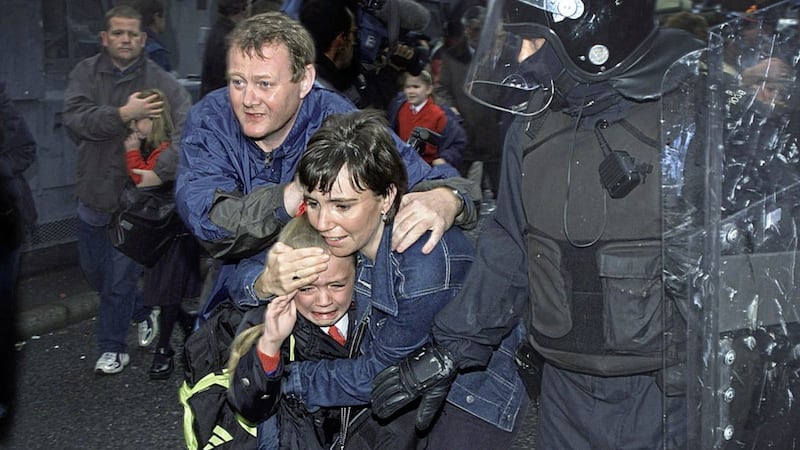Of the many residents living in long established local communities across Belfast, few have retained as fierce a sense of loyalty, cohesion and identity as the people who call Ardoyne their home.
The old hands in the district will still point out that the long streets of Glenard, for a half century now the trademark image associated with the area, were but an appendage to the real Ardoyne neighbourhood which consisted of the maze of a dozen or so tight streets running off the Crumlin Road and Flax Street, including Chatham Street which famously divided into three sections known to locals as heaven, purgatory and hell.
The Troubles came early to Ardoyne. Samuel McLarnon and Michael Lynch were both killed by the RUC in August 1969 as loyalists coalesced with the police to attack the area, forcing many Catholics to flee burnt out homes, taking refuge in the classrooms of Holy Cross Boys’ school located in the centre of the district.
History was merely repeating itself, for fifty years earlier a reign of terror was visited upon the area by police and loyalists leaving death in its wake as the northern state flamed into existence.
The Scannal programme that aired on RTÉ last week provided a painful reminder of one of the darkest chapters of our most recent history.
The loyalist blockade of Holy Cross Girls' school in 2001 was a shocking and shameful episode that indicted not only the adults who participated in this squalid protest but also those unionist and loyalist leaders who sought to provide cover for the naked supremacist and sectarian hatred that lay behind the appalling scenes.
The contrast between the conduct of the protesters, their apologists and the dignified actions of the parents and children could not have been greater.
One theme referenced during the commentary provided within the documentary was the idea peddled at the time that loyalists were merely lashing out through the protest because they felt besieged and were living in fear of their neighbours.
This narrative was as nonsensical back then as it remains today and the church, political and community leaders who gave it credence did themselves a disservice at a time when true leadership meant standing up vocally and decisively against those orchestrating a truly indefensible campaign.
Fear is not a synonym for intolerance, and fear played no part in motivating those lining the road to berate children walking to school. These were actions born and raised in hate and deeply held prejudices that needed called out instead of excused or indulged.
We know that sectarianism is not the exclusive preserve of any one community, and there are regular reminders in this part of the world that people from all perspectives and backgrounds are capable of letting themselves down by engaging in sectarian acts and using inappropriate and offensive vocabulary to demean and even demonise the Other.
The real enduring lesson of Holy Cross was that leadership makes a difference.
The leadership provided by school leaders like Anne Tanney, principal of the Girls’ school, who carried the heavy burden of the stress and anxiety of the children, parents and staff with incredible composure and dignity; of Terry Laverty, principal of the Boys’ school who made the walk every day with the children and parents in a brave act of solidarity and much needed support; of Fr Aidan Troy and Fr Gary Donegan, who led from the front and stood for what was right in spite of the torrid and relentless abuse they endured; and of the political leaders in Ardoyne who worked tirelessly to calm understandably angry voices thus preventing a volatile and dangerous situation from spiralling out of control only three years after the Good Friday Agreement.
The absence of positive leadership within unionism let down not just the children and parents of Holy Cross but also the residents of Glenbryn and others caught up in the protest, who needed firm voices of authority from within to lead a community that had lost its way.
Fast forward two decades and the political terrain of north Belfast has markedly changed. Alas, the local DUP today are vociferously opposing houses on the Hillview site which could ease the waiting list crisis in Ardoyne.
As Talleyrand said of the Bourbons: “They have learned nothing and forgotten nothing.”









